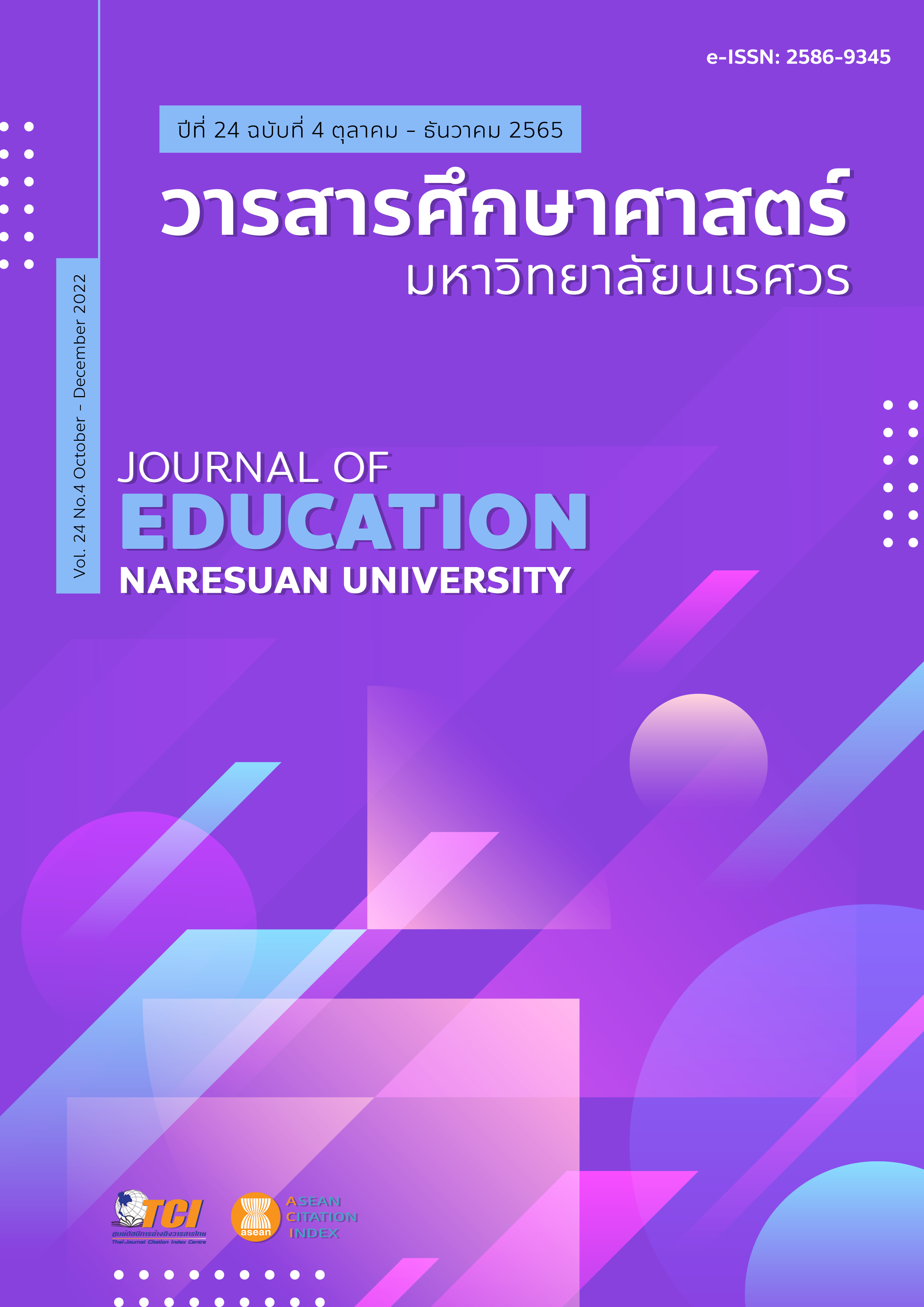EFFECTS OF CADET SELF-EFFICACY ON CADET MILITARY ACHIEVEMENT OF CADET STUDENTS WHICH GRIT AND WELL-BEING AS MEDIATORS อิทธิพลของการรับรู้ความสามารถของตนเองที่มีต่อผลสัมฤทธิ์ทางทหารของนักเรียนนายร้อยโดยมีความเพียรและสุขภาวะเป็นตัวแปรส่งผ่าน
Main Article Content
Abstract
The purposes of this research were 1) to study the level of self-efficacy, grit, well-being, and cadet military achievement, 2) to examine the goodness of fit of the structural equation modeling of effects of self-efficacy on military achievement of cadet students with grit and well-being as mediators with the empirical data, and 3) to analyze the role of mediators of grit and well-being of the structural equation modeling of effects of self-efficacy on military achievement of cadet students. The participants were 805 second to fifth-year cadet students and chosen by stratified random sampling. Research instruments were a self-efficacy scale, a grit scale, and a well-being scale. Data were analyzed using Structural Equation Modeling (SEM). Findings were as follows: 1) Overall, the cadet students had a high level of well-being (%RWB = 70.00) whereas their cadet military achievement, grit, and self-efficacy are at a moderate level (%RCMA = 47.25; %RGRT = 44.00; %RSE = 35.00). 2) The result from the Structural Equation Modeling indicated that the model fit well to the empirical data (Chi-Square = 44.620, df = 36, p-value = 0.131, Chi-Square/df = 1.239, GFI = 0.991, AGFI = 0.978, NFI = 0.997; RMR = 0.015, RMSEA = 0.018). 3) Self-efficacy had direct influence on cadet military achievement (β = 0.765, p <. 05) whereas grit had a negative effect on cadet military achievement (β = -0.704, p < .05). However, there was no significance effect of well-being on cadet military achievement.
Article Details

This work is licensed under a Creative Commons Attribution-NonCommercial-NoDerivatives 4.0 International License.
The owner of the article does not copy or violate any of its copyright. If any copyright infringement occurs or prosecution, in any case, the Editorial Board is not involved in all the rights to the owner of the article to be performed.
References
Bandura, A. (1977). Self-efficacy: Toward a unifying theory of behavioral change. Psychological Review, 84(2), 191-215.
Bandura, A. (1997). Self-efficacy: The exercise of control. New York: W H Freeman/Times Books/Henry Holt & Co.
Cadet Regiment King's Guard Chulachomklao Royal Military Academy. (2019). Manual of Cadet Student 2019. Bangkok: Aroonkarnpim. [in Thai]
Chulachomklao Royal Military Academy. (2015). Curriculum of Chulachomklao Royal Military Academy 2015 (5 years). Retrieved October 15, 2019, from http://www.crma.ac.th/edu/EDU.pdf [in Thai]
Cooper, A. (2014). Exploring the use of non-cognitive factors in predicting college academic outcomes (Master thesis). Chattanooga, TN: University of Tennessee.
Credé, M., Tynan, M. C., & Harms, P. D. (2017). Much ado about grit: A meta-analytic synthesis of the grit literature. Journal of Personality and Social Psychology, 113(3), 492-511.
Disabato, D. J., Goodman, F. R., & Kashdan, T. B. (2019). Is grit relevant to well-being and strengths? Evidence across the globe for separating perseverance of effort and consistency of interests. Journal of Personality, 87(2), 194-211.
Duckworth, A. L., Peterson, C., Matthews, M. D., & Kelly, D. R. (2007). Grit: Perseverance and passion for long-term goals. Journal of Personality and Social Psychology, 92(6), 1087–1101.
Duckworth, A. (2016). Grit: The power of passion and perseverance. New York: Scribner/Simon & Schuster.
Gilson, T. A., Dix, M. A., & Lochbaum, M. (2016). “Drive On”: The relationship between psychological variables and effective squad leadership. Military Psychology, 29(1), 58-67.
Hair, J. F., Black, W. C., Babin, B. J., & Anderson, R. E. (2014). Multivariate data analysis: Pearson new international edition (7th ed.). Harlow, Essex: Pearson.
Jiang, W., Jiang, J., Du, X., Gu, D., Sun, Y., & Zhang, Y. (2019). Striving and happiness: Between- and within-person-level associations among grit, needs satisfaction and subjective well-being. The Journal of Positive Psychology, 15(4), 543–555. https://doi.org/10.1080/17439760.2019.1639796
Oprins, E. A. P. B., Bosch, K. V. D., & Venrooij, W. (2018). Measuring adaptability demands of jobs and the adaptability of military and civilians. Military Psychology, 30(6), 576-589.
Phan, H. P., Ngu, B. H., & Alrashidi, O. (2016). Role of student well-being: A study using structural equation modeling. Psychological Reports, 119(1), 77-105.
Pekrun, R., Goetz, T., Frenzel, A. C., Barchfeld, P., & Perry, R. P. (2011). Measuring emotions in students’ learning and performance: The Achievement Emotions Questionnaire (AEQ). Contemporary Educational Psychology, 36(1), 36-48.
VandenBos, G. R. (2015). APA dictionary of psychology (2nd ed.). Washington, DC: American Psychological Association.
Vie, L., Scheier, L., Lester, P., & Seligman, M. (2016). Initial validation of the U.S. Army Global Assessment Tool. Military Psychology, 28(6), 468-487. DOI:10.1037/mil0000141


